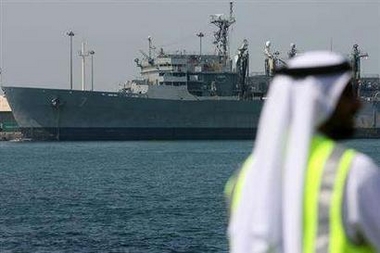Center
Radioactive matter gets U.S. into test
(AP)
Updated: 2006-03-28 20:17
 |
Large Medium Small |
Installing radiation detectors at U.S. entry points is taking too long and costing too much, says a congressional watchdog agency whose undercover investigators breached security by slipping nuclear material into the United States.
 A DP World security guard stands in front of a U.S. military ship at the Dubai Port, February 27, 2006. The White House on Monday withdrew the nomination of a former Dubai Ports World executive to direct maritime affairs after his appointment was blocked in the Senate during a political storm over port security. [Reuters] |
In a test last year, the small amounts of cesium-137, which is used in industrial gauges, triggered radiation alarms in Texas and Washington state. The material was enough to make two small "dirty bombs," officials said, yet U.S. customs agents permitted the investigators to enter the United States because they were tricked with counterfeit documents.
The Bush administration says that within 45 days it will give U.S. Customs and Border Protection agents the tools they need to verify such documents in the future.
Senators were to grill administration officials on security problems identified during the Government Accounting Office's undercover operation during a Senate Homeland Security subcommittee hearing Tuesday.
In a series of reports, the GAO, which is the investigative arm of Congress, found that the Homeland Security Department's goal of installing 3,034 radiation detectors by September 2009 across the United States — at border crossings, seaports, airports and mail facilities — was "unlikely."
Investigators also said the government probably will spend $342 million more than it expects to complete the job, given its current costs and pace. Between October 2000 and October 2005, they said, the government spent about $286 million installing radiation monitors inside the United States.